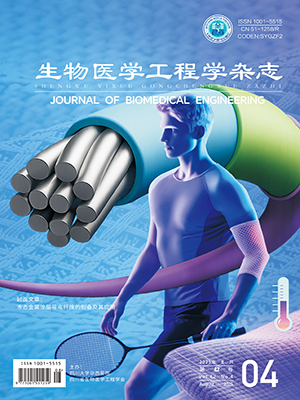| 1. |
Mühl C, Brendan A, Anton N, et al. A survey of affective brain computer interfaces: principles, state-of-the-art, and challenges. Brain-Comput Interfa, 2014, 1(2): 66-84.
|
| 2. |
蒋小梅, 张俊然, 陈富琴, 等. 基于 J48 决策树分类器的情绪识别与结果分析. 计算机工程与设计, 2017, 38(3): 761-767.
|
| 3. |
苏建新. 基于脑电信号的情绪识别研究. 南京: 南京邮电大学, 2015.
|
| 4. |
杨豪, 张俊然, 蒋小梅, 等. 基于深度信念网络脑电信号表征情绪状态的识别研究. 生物医学工程学杂志, 2018, 35(2): 182-190.
|
| 5. |
Jayaram V, Alamgir M, Altun Y, et al. Transfer learning in brain-computer interfaces. IEEE Comput Intell Mag, 2016, 11(1): 20-31.
|
| 6. |
Pan S J, Tsang I W, Kwok J T, et al. Domain adaptation via transfer component analysis. IEEE Trans Neural Netw, 2011, 22(2): 199-210.
|
| 7. |
Ponti M, Kittler J, Riva M, et al. A decision cognizant Kullback-Leibler divergence. Pattern Recog, 2017, 61(SI): 470-478.
|
| 8. |
Fuglede B, Topsøe F. Jensen-Shannon divergence and Hilbert space embedding// International Symposium on Information Theory. Chicago: IEEE, 2005: 30.
|
| 9. |
Sejdinovic D, Sriperumbudur B, Gretton A, et al. Equivalence of distance-based and RKHS-based statistics in hypothesis testing. Ann Stat, 2013, 41(5): 2263-2291.
|
| 10. |
Zheng Weilong, Lu Baoliang. Personalizing EEG-based affective models with transfer learning// International Conference on Artificial Intelligence. New York: AAAI Press, 2016: 2732-2738.
|
| 11. |
Jin Yiming, Luo Yudong, Zheng Weilong, et al. EEG-based emotion recognition using domain adaptation network// 2017 International Conference on Orange Technologies (ICOT). Singapore: IEEE, 2017: 222-225.
|
| 12. |
Ghifary M, Kleijn W B, Zhang M. Domain adaptive neural networks for object recognition// Pacific Rim International Conference on Artificial Intelligence (PRICA). Gold Coast: Springer, 2014: 898-904.
|
| 13. |
Li Jinpeng, Qiu Shuang, Du Changde, et al. Domain adaptation for EEG emotion recognition based on latent representation similarity. IEEE T Cogn Dev Syst, 2020, 12(2): 344-353.
|
| 14. |
Long Mingsheng, Wang Jianmin, Ding Guiguang, et al. Transfer feature learning with joint distribution adaptation// Proceedings of the 2013 IEEE International Conference on Computer Vision (ICCV). Washington DC: IEEE, 2013: 2200-2207.
|
| 15. |
Liu Zhaohua, Lu Baoliang, Wei Hualiang, et al. Fault diagnosis for electromechanical drivetrains using a joint distribution optimal deep domain adaptation approach. IEEE Sens J, 2019, 19(24): 12261-12270.
|
| 16. |
Le Q V, Ranzato M, Monga R, et al. Building high-level features using large scale unsupervised learning// 2013 IEEE International Conference on Acoustics, Speech and Signal Processing (ICASSP). Edinburgh: IEEE, 2013: 8595-8598.
|
| 17. |
Yosinski J, Clune J, Bengio Y, et al. How transferable are features in deep neural networks?// International Conference on Neural Information Processing Systems (NIPS’14). Montreal: MIT Press, 2014: 1-9.
|
| 18. |
Goodfellow I J, Pouget-Abadie J, Mirza M, et al. Generative Adversarial Networks// Advances in Neural Information Processing Systems (NIPS’14). Montreal: MIT Press, 2014, 3: 2672-2680.
|
| 19. |
Zheng Weilong, Lu Baoliang. Investigating critical frequency bands and channels for EEG-based emotion recognition with deep neural networks. IEEE T Auton Ment De, 2017, 7(3): 162-175.
|
| 20. |
Taud H, Mas J F. Multilayer perceptron (MLP), geomatic approaches for modeling land change scenarios. New York: Springer International Publishing, 2018.
|
| 21. |
Ghayoumi M, Bansal A K. Emotion in robots using convolutional neural networks// International Conference on Social Robotics (ICSR). Kansas City: Springer International Publishing, 2016: 285-295.
|
| 22. |
Wang X, Fouhey D, Gupta A. Designing deep networks for surface normal estimation// Proceedings of the IEEE Conference on Computer Vision and Pattern Recognition (CVPR). Boston: IEEE, 2015: 539-547.
|
| 23. |
Nair V, Hinton G E. Rectified linear units improve restricted Boltzmann machines// Proceedings of the 27th International Conference on Machine Learning (ICML-10). Haifa: Omnipress, 2010: 807-814.
|
| 24. |
Saito K, Watanabe K, Ushiku Y, et al. Maximum classifier discrepancy for unsupervised domain adaptation// 2018 IEEE/CVF Conference on Computer Vision and Pattern Recognition (CVPR). Salt Lake City: IEEE, 2018: 3723-3732.
|
| 25. |
Laurens V D M, Hinton G. Visualizing Data using t-SNE. J Mach Learn Res, 2008, 9(2605): 2579-2605.
|




